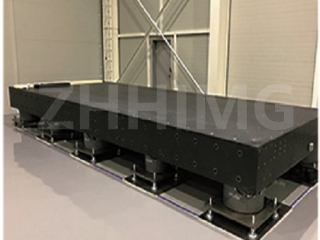The use of granite components in Coordinate Measuring Machines (CMM) is a well-established practice in the manufacturing industry. Granite is a naturally occurring rock that possesses excellent properties such as thermal stability, low coefficient of thermal expansion, and high stiffness. These properties make it an ideal material for use in the manufacture of sensitive measuring instruments such as CMMs. These properties ensure high measurement accuracy that is critical to the manufacturing industry.
Thermal stability is one of the most essential properties of granite. CMMs are precision instruments that must be stable even in the presence of temperature fluctuations. The use of granite as a construction material ensures that the machine remains stable, no matter the temperature changes. The coefficient of thermal expansion of granite is low, which ensures that any thermal expansion is minimal, allowing measurements to remain consistent over a wide range of operating temperatures. This property is critical to the accuracy of the measurements made by CMMs.
The low coefficient of thermal expansion of granite ensures that the measurements taken by CMMs remain accurate even when there are temperature changes. Temperature changes can affect the size and shape of objects being measured. However, the use of granite as a construction material for CMMs ensures that any change in temperature does not affect the accuracy of the measurements. This property is essential in the manufacturing industry, where accuracy is critical in ensuring that finished products meet customer specifications.
High stiffness is another important property that makes granite an ideal material for CMMs. The components used in CMMs must be rigid to support the measuring element, which is usually a sensitive probe. The use of granite ensures that the machine remains rigid, minimizing any deformation caused by the weight of the measuring element. This property ensures that the measuring probe moves precisely along the three axes (x, y, and z) needed to take the measurements accurately.
The use of granite in CMM construction also ensures that the machine remains stable in the long term. Granite is a dense, hard material that does not warp, bend, or sag over time. These properties ensure that the machine will retain its accuracy and precision over many years of operation. Additionally, granite is resistant to wear and tear, meaning that it requires minimal maintenance, reducing downtime and increasing the machine's longevity.
In conclusion, the use of granite in CMM construction is essential in ensuring high measurement accuracy in the manufacturing industry. The unique properties of granite, such as thermal stability, low coefficient of thermal expansion, and high stiffness, ensure that the machine remains accurate even in the presence of temperature fluctuations. Additionally, granite's durability and resistance to wear ensure that the machine retains its accuracy over many years of operation. Overall, the use of granite in CMMs is a wise investment in ensuring productivity and quality in the manufacturing industry.
Post time: Apr-09-2024

